
Al Mamun Harun Ur Rashid :
Nearly 12 years have elapsed since the government took initiative to free the capital at first and then the whole country from beggars, but its success story is not worth mentioning.
Sources said that the government agencies are giving their all-out efforts but they are facing the pyramid of challenges to curb the rising number of paupers in every nook and cranny especially in the capital.
They said that as begging make quick money, a number of syndicates are engaged in this business and making quick money. Until the chain of syndicates is broken, it is hard to entirely eradicate the baggers from the capital.
When the country is moving forward with various development projects including Padma Bridge and Metro Rail, the number of mendicants is swarming in the capital to earn their livelihoods in the streets.
The Ministry of Social Welfare and the Department of Social Services (DSS) sources said that as per their official list in the last one era they have rehabilitated only 16,207 beggars though they don’t have the exact figures of baggers.
As per DSS, there were around 50,000 beggars in the capital, but the number has become doubled or more in the last several years.
“We don’t have the exact number of beggars. But an estimate of FY 2017-2018, there were around 2.5 lakh beggars in the country. But the figure is rising rapidly,” Md Shah Jahan, Programme Director of Programme on Rehabilitation and Alternative Employment for the People Engaged in Begging, told the New Nation on Wednesday.
Sources said that ubiquitous presence of the paupers in the capital is tarnishing the image of the country and it sends a wrong message to the foreigners and development partners about Bangladesh.
In the initial stage in 2010, the government earmarked several important points in the capital like diplomatic zone, airport, Radisson Hotel, Sonargaon Hotel, Intercontinental Hotel, Bailey Road and VIP roads to free from baggers.
Mobile courts were conducted to resist the mendicants from begging in these areas and even they were sent to the rehabilitation centres, but the baggers came back to the streets with the connivance of the syndicate, sources said.
At present, baggers are seen in all the busy intersections, Bijoy Sarani, Parliament area, Secretariat, shopping malls, in front of the hotels and restaurants, foot over-bridges and on the pavements as well.
People feel irritated when one after another indignant people approach an individual and asking for alms.
“Giving alms has reward according to Islam but when you are encountered one after another baggers asking alms, it’s really a nuisance,” Shariful Islam, a city dweller said.
Even some witnesses said that when a foreigner comes out of the hotel, he/she cannot walk freely in the streets due to the disturbances of the beggars and such incidents tarnish the country’s image.
A 39-year old bagger, Jalal, who has got one of his legs crippled by polio in childhood, begs at the Matijheel and Kamalapur areas.
“Now-a-days the income has decreased. But before coronavirus pandemic, the income was satisfactory. Now I hardly earn one thousand taka. People don’t give more alms now,” he said.
Asked if he wants to be rehabilitated, he said, “I have heard about it. But I love to earn independently. I have freedom here.”
The DSS sources said they have acute shortage of manpower and rehabilitation centres which is a major bottleneck for keeping a huge number of beggars for rehabilitation programme.
Sources said that recently Prime Minister Sheikh Hasina has witnessed the rising number of beggars in the capital and directed to the concerned Parliamentary Standing Committee to take immediate action.
With this aim, the government allocated Tk 26.80 crore in the FY 2021-22 for the construction of rehabilitation houses made of corrugated iron sheets and the beggars’ rehabilitation training.
The government is now so serious about the eradication of beggary, an age-old social problem, that the budgetary allocation has become several times more compared with the FY 2020-2021 when the allocation was only six crore taka.
In the FY 2019-20, the allocation was Tk3.7 crore, in FY2018-19, it was three crore, DSS sources said.
Sources said that the government has started the construction of 16 beggars’ rehabilitation centres in four districts in Dhaka, Narayanganj, Gazipur and Mymensingh. Each centre will have the capacity of 52 inmates.
“We hope that the centres will be ready by June. Then our drive will be intensified. We cannot allow the baggers to tarnish the country’s image,” Shah Jahan said.
“As bagging is a social problem. We need concerted efforts of all concerned stakeholders,” he added.
“Beggars don’t want to quit beggary because it brings quick money. So job creation is necessary for the able-bodied baggers so that they can lead a dignified life,” he said.
“If we can provide short term and long term training for income generation, many will not return to this downgraded occupation,” he said.
Only continuous efforts by concerned bodies can make the capital free of paupers and beggary, sources said.

